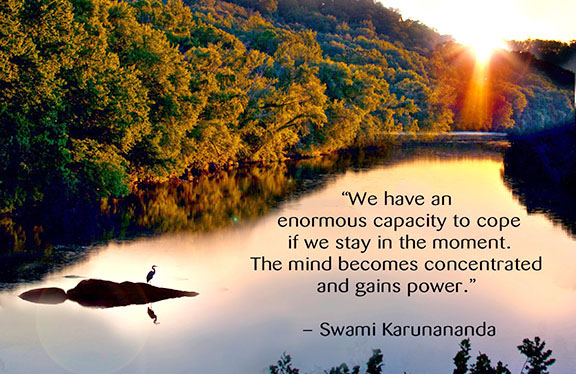 Depending on our temperament, we can pursue the journey of awakening in various ways. If we wish to develop the will and gain mastery over the mind, we can take a Raja Yoga approach. If we tend to be analytical and intellectual, there is the path of Jnana Yoga. If we are more devotional by nature, we can take a Bhakti Yoga approach. If we have an active temperament, there is Karma Yoga. Whatever approach we choose, we can transform our daily lives into spiritual practice, preparing us for the highest realization.
Depending on our temperament, we can pursue the journey of awakening in various ways. If we wish to develop the will and gain mastery over the mind, we can take a Raja Yoga approach. If we tend to be analytical and intellectual, there is the path of Jnana Yoga. If we are more devotional by nature, we can take a Bhakti Yoga approach. If we have an active temperament, there is Karma Yoga. Whatever approach we choose, we can transform our daily lives into spiritual practice, preparing us for the highest realization.
RAJA YOGA
Raja Yoga is the science of meditation. It addresses of every level of the individual—physical, mental, intellectual, social and spiritual—and aims at total self-mastery. Through daily practice, the body and mind are purified and strengthened, making them fit to handle any challenges that may arise. The Raja Yogi realizes the Self within and then sees that same Spirit in everyone and everything.
Hints for Daily Practice:
- Practice meditation daily. If you are a beginner, try to have two sittings of at least fifteen minutes every day. Gradually, increase the length till you can sit for thirty to sixty minutes at a time.
- Practice pranayama daily. It is an excellent preparation for meditation and will help you to maintain optimal health and vitality.
- Observe your breath as you go about your daily activities. If it becomes disturbed, make it calm, slow, steady, and smooth. The breath and the mind go together. By regulating the breath, you will bring the mind under control.
- If you have an emotional or behavioral pattern you would like to change, employ Pratipaksha Bhavana. This technique helps to overcome negative patterns by consciously cultivating the opposite positive ones. It can be combined with the breath. As you inhale, visualize that along with the breath, you are drawing into yourself the positive quality you wish to develop. Feel like it is filling you completely. When you exhale, visualize that the negative pattern is leaving with the breath.
- To help retain your peace in all situations, practice the “Locks and Keys.” Cultivate the attitudes of: friendliness towards the happy, compassion for the unhappy, delight in the virtuous, and disregard for the wicked.
- Select one of the precepts of yama (non-violence, truthfulness, non-stealing, moderation, and non-greed) or niyama (purity, contentment, accepting pain as help for purification, spiritual study, worship or surrender to God) and try to practice it throughout the day.
 Swami Karunananda is a senior disciple of Sri Swami Satchidananda. In 1975, she was ordained as a monk into the Holy Order of Sannyas. She has had almost 50 years experience teaching all aspects of Yoga and specializes now in workshops, retreats, and teacher training programs that focus on the science of meditation, the philosophy of Yoga, personal transformation, and Yoga breathing techniques for better health and well-being. She developed, and for 30 years has taught, the Integral Yoga Teacher Training programs in Raja Yoga and in Meditation.
Swami Karunananda is a senior disciple of Sri Swami Satchidananda. In 1975, she was ordained as a monk into the Holy Order of Sannyas. She has had almost 50 years experience teaching all aspects of Yoga and specializes now in workshops, retreats, and teacher training programs that focus on the science of meditation, the philosophy of Yoga, personal transformation, and Yoga breathing techniques for better health and well-being. She developed, and for 30 years has taught, the Integral Yoga Teacher Training programs in Raja Yoga and in Meditation.
Swami Karunananda served as president of Satchidananda Ashram–Yogaville in Virginia and in California, as well as director of the Integral Yoga Institutes in San Francisco and in Santa Barbara. She currently serves on the Board of Trustees, and as the chairperson of the Spiritual Life Board at Satchidananda Ashram–Yogaville, VA.
Interested in fostering interfaith understanding and harmony, she is featured in the interfaith documentary entitled, With One Voice. She also compiled and edited the Lotus Prayer Book, a collection of prayers from various faith traditions, and Enlightening Tales as told by Sri Swami Satchidananda. She served as contributing editor for The Breath of Life: Integral Yoga Pranayama, as well as a senior writer for the Integral Yoga Magazine. A newly released publication of hers, Awakening: Aspiration to Realization Through Integral Yoga, describes the spiritual path and provides guidance for the journey.


